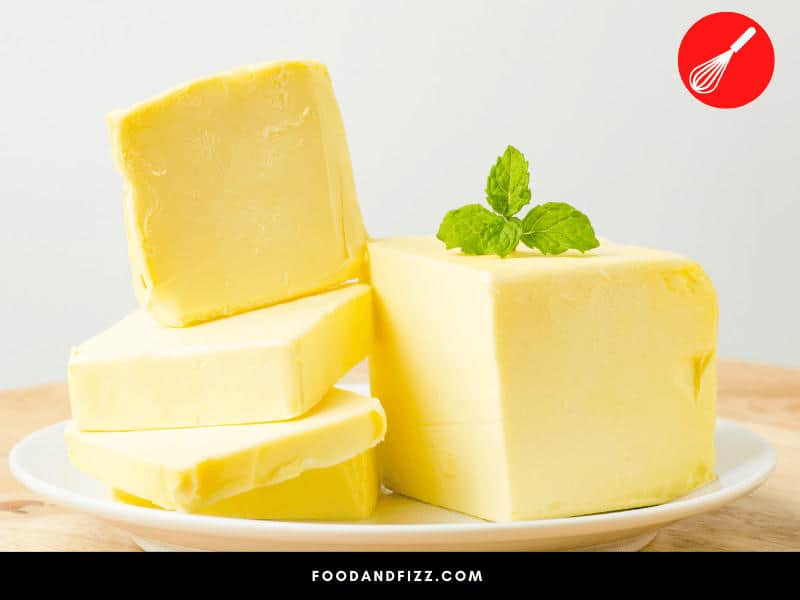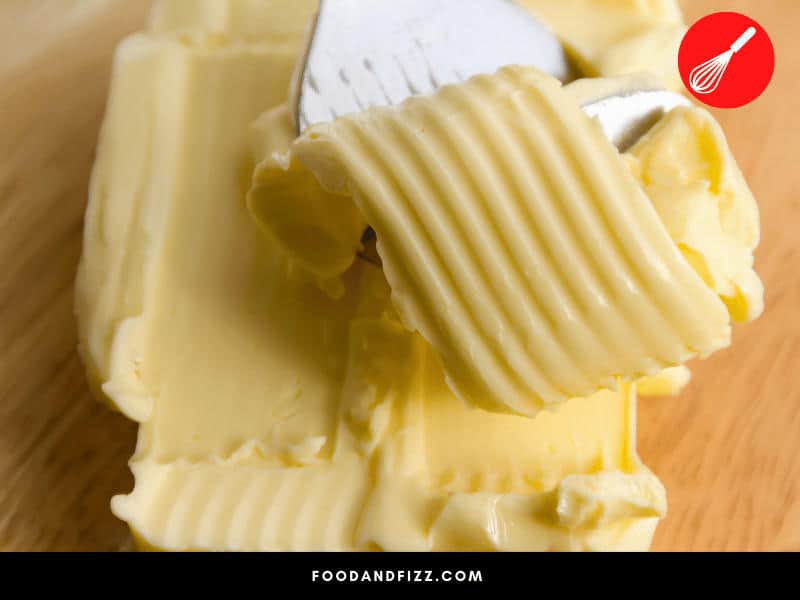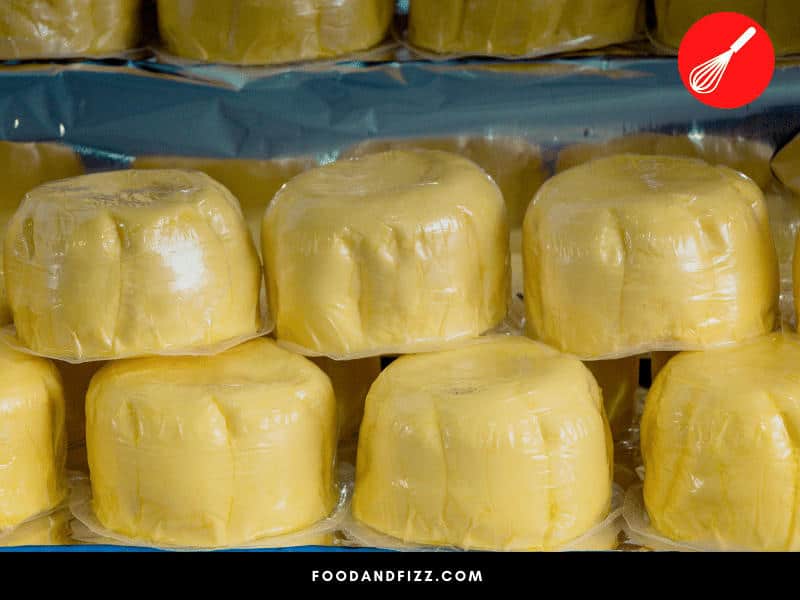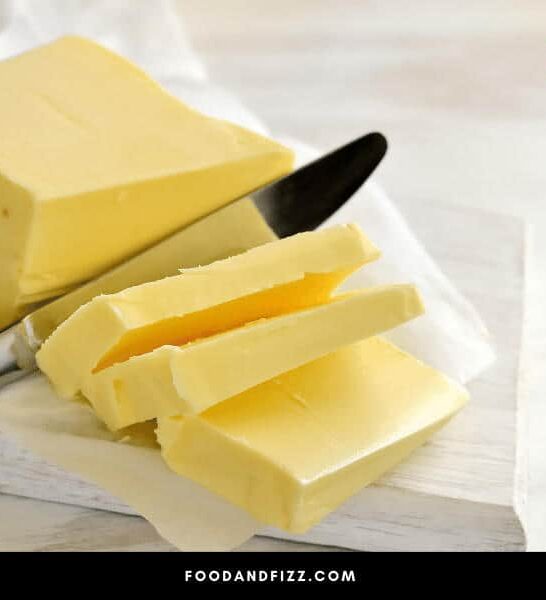Your butter smells like cheese? Why is that? When food goes “off”, it has reached a state in which bacteria have multiplied to the point where their toxins and waste products have overwhelmed the food.
Our olfactory receptors (a fancy way of saying “sense of smell”) pick up the spoor of these artifacts and absolutely scream at us, “Don’t do it, dude. Don’t put this in your mouth!”
As we were growing up, sometimes we listened to what our sense of smell was telling us, and sometimes we didn’t.
Over the years, it became clear that our noses weren’t lying, and we should not put these things into our bodies because the outcomes were unpleasant.
With time, this friendship connection to what our noses were telling us became a trust relationship, and now when we smell anything even slightly “off”, we loathe to take a chance.
We all know what cheese smells like. Butter usually has a subtle-to-none smell, so we might not even know what butter smells like, but we know it ain’t supposed to smell like cheese.
I’ve been asked more than once, what’s the story when butter smells like cheese? Well, here’s the answer.
Butter Smells Like Cheese
Butter smells like cheese when its water molecules decompose enough of its fat molecules to allow the exponential reproduction of bacteria. As the bacteria rapidly multiply, they excrete waste and other toxic materials from their metabolic activity. It is these toxins that give off both the smell of putrefaction and the butter’s sour taste.

Butter Can Go Off Too, But Much More Slowly Than Other Dairy Products
Bacterial heaven is a food substrate with plenty of water sloshing around. (Bear in mind that what is an ocean of water to a bacterium is not even a droplet of water to us; be careful with my imagery, please.)
The thing is, being made of mostly dairy fat and proteins, butter is gorgeous real estate for bacteria, except for one cotton-pikin’ problem: there isn’t a great deal of water swilling around in the butter.
This lack of water is an excellent boon for us humans because it means that butter is a problematic food for bacteria to overwhelm, even at room temperature.

Dairy products and Time/Temperature Sensitivity
The FDA defines a TCS (Time/temperature Control for Safety) standard for dairy products like cheese and milk.
This means that the FDA is basically saying, “Fella, you’re dicing with serious illness or even death” if you leave dairy products lying around carelessly for more than one, or, at most, two hours. TCS foods must be stored at 40°F (about 5°C) or lower to prevent food poisoning.
Surprisingly, pasteurized butter isn’t TCS food. I’ve friends and family who leave the stuff lying around for days, even up to two weeks!
Okay, I’m not so darned chillaxed as these folks, and whereas I’m perfectly happy to leave butter lying around for a few minutes, I try to get it back into the fridge as quickly as possible. Maybe I’m just a bit OCD about it, but I figure, why take the chance?
Pasteurized Butter vs. Salted Butter vs. Unsalted Butter vs. Farm-fresh Butter
Pasteurized Butter
Pasteurized butter is butter that has been processed to kill off any harmful germs that may have been present in the milk from which the butter came. Milk is notorious for harboring bacteria, some of which can be pretty unpleasant for humans, and by “unpleasant,” I mean deadly.
Here, I’m talking about bacteria like E. coli, which is just as happy to kill you as it is to say, “Howdy, now head off to the bathroom and empty your already empty guts one more time.”
When pasteurized correctly, butter is safe to eat even when left out at room temperature. Watch out, though, if it melts. That means the ambient temperature is too high for the butter, and you must throw it away.

Salted Butter
Salted butter is usually pasteurized (to kill existing germs), then salted (to protect against a new invasion of germs and, let’s face it, to make it taste better too).
Salted butter is super safe–the caveat about it melting still applies–and this is the butter some of my friends and family leave out on the kitchen counter for up to two weeks.
Unsalted Butter
Unsalted butter is probably pasteurized if bought from the mall or a grocery chain store. On the other hand, it might not be pasteurized if purchased from an artisanal shop or a farmer’s stall.
Whenever people ask me about “butter that smells like cheese”, I like to show off by expressing my “surprise” at their preference for unsalted butter.
I’m batting 1.0 for being wrong because this is the kind of butter that invariably starts smelling funky in only a few days outside the fridge (and sometimes from inside the fridge too, when kept for weeks on end.)
Farm-fresh Butter
Look, farm-fresh butter is probably salted to give it some flavor and to give the butter some preservative protection, but it is unlikely to be pasteurized.
Okay, the owners will undoubtedly have pasteurized butter on a big commercial farm, but here, I’m speaking about modest family-owned farms.
Butter from small farms is fresh when you buy it, and by golly, it had better be fresh when you eat it too. Treat it as unpasteurized and eat it as soon as possible after buying it.
In the absence of stuffing it all down soon after purchase or using it to make delectable baked delicacies, refrigerate the butter asap and religiously keep it refrigerated.

When Butter Smells Funky
Butter smells funky when it has been overwhelmed by bacteria that have excreted enough waste products to become noticeable. Basically, your butter has turned into a bacterial cesspool, and that cheesy smell is the outcome.
You see, butter does have some water in it, and although the amount is comparatively small, it is still enough to act on molecules of fat which boosts the decomposition of fat molecules already being caused by bacteria.
As more and more fat decomposes, more and more bacteria join the party and get grooving, which makes more fat decompose, which causes more bacteria to get going, etc., etc. It’s a feedback loop of the worst kind from a human’s point of view.

Can I Eat Butter that Smells Like Cheese?
You can eat it, but I would advise against it. If you don’t eat much of it, you will probably be okay or just have soft stool for a day or two.
However, if you overeat it or are unlucky, you could end up with anything from nausea and vomiting, to dysentery and dehydration, to nervous tremors and a full-blown case of E. coli and possibly a trip to the ER or the morgue.
It’s up to you, of course. (As Dirty Harry might say, “You’ve got to ask yourself, do you feel lucky? Well, do you–punk?”)
Afterword: Butter Smells Like Cheese
Although butter is a dairy product, even the FDA recognizes that it isn’t quite as time/temperature sensitive as its companion dairy products, cheese, and milk. In late-autumn to midish spring, ambient temperatures at or below 70°F, butter can last up to a fortnight or so on your kitchen counter.
Eventually, all butter begins to smell like parmesan cheese, look discolored, and taste sour. Healthy butter never smells like cheese.
Frequently Asked Questions to Butter Smells Like Cheese
Is Butter That Smells Like Cheese Safe to Eat?
Butter that smells like cheese is probably laden with bacteria and would be unsafe to eat. While small amounts aren’t likely to cause any harm, it is possible to get very sick and acquire a serious food-borne illness from eating it.
What Does Bad Butter Smell Like?
Fresh butter should not have a very strong smell. If it smells like cheese, smells rancid or has any other strong odor, it means it has gone bad.
Does Butter Go Bad?
Butter does go bad, just not as fast as other dairy products due to its minimal water content. But as with all other food, it will eventually go bad.

